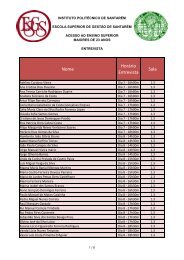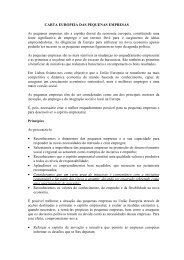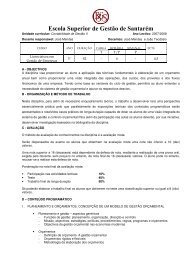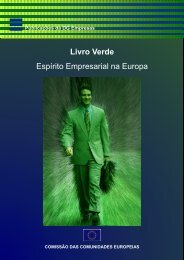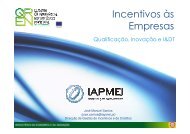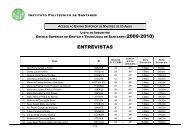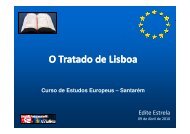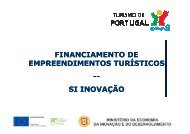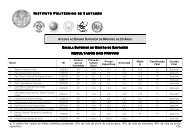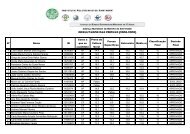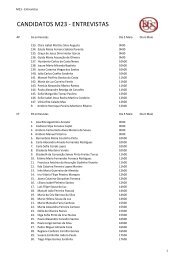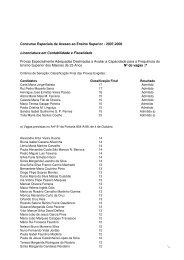Preface by Viviane Reding, European Commissioner Responsible ...
Preface by Viviane Reding, European Commissioner Responsible ...
Preface by Viviane Reding, European Commissioner Responsible ...
- No tags were found...
Create successful ePaper yourself
Turn your PDF publications into a flip-book with our unique Google optimized e-Paper software.
EUROPEAN YEAR OF LANGUAGES 2001: SOME HIGHLIGHTSCelebrating languagesEurope’s linguistic diversity is one of its greatstrengths, intrinsically linked with its culturalvariety.The <strong>European</strong> Commission attaches greatimportance to the role of learning languages inpromoting cultural understanding, both among<strong>European</strong>s and between <strong>European</strong>s and others.Mary McAleese, President ofIreland, meets children at theLanguages Lift Off in Dublin on26 September47% of peoplein the EU can speakno language other thantheir mother tongue.Having language skills makes people more ableto embrace different cultures rather than feelthreatened <strong>by</strong> them. Equally, access to theculture associated with a language is apowerful motivation for learning it.Words426% of people in the EUcan speak at leasttwo languages other thantheir mother tongue.Most of the projects the Commission fundedduring the Year had cultural aspects. Somewere centred on bringing people from differentcountries together or on multilingual culturalfestivals. Others were simply enjoyableactivities which helped to promote the Year’smessages.For example, the project coordinated <strong>by</strong> theFrench Ministries of Culture, Foreign Affairs,Education and Youth/Sport "Dix mots pour leslangues du monde" (Ten words for thelanguages of the world) was simple, yet inspiring.A panel of linguists, writers and artists chose tenwords in French, and created a short text orpoem around each word. The list was translatedinto ten languages: Spanish, German, English,Italian, Portuguese, Occitan, Hungarian, Arabic,Haitian Creole and Lingala (spoken mostly inZaire and the Congo).The words were circulated throughout Franceand beyond via a booklet and Internet site, withan invitation to use them as a starting point forcreative work, in any language. The invitationwas taken up <strong>by</strong> hundreds of schools, businesses,cultural organisations and individuals. Therewere over three hundred lectures, workshops,exhibitions and competitions based on thewords.With its project "In Other Words", the Artslaborganisation in Ireland wanted to strengthenlinks with other areas of Europe wherebilingualism and minority languages are animportant part of culture and identity.Simultaneous celebrations of the <strong>European</strong> Dayof Languages on 26 September were organisedin the Republic of Ireland (Cabinteely, DúnChaoin), Northern Ireland (Derry, Enniskillen),Catalonia (Toroella de Montgris) and the BasqueCountry (Bera de Bidasoa). Further celebrationswere organised for Christmas.Young people from each place created a multilingualInternet site to exchange informationabout traditional festivals. Meanwhile, youngartists created original works representing theproject, including a board game and a cloak withpockets filled with objects linked with theparticipating cities, towns and villages.Enjoying languagesOne of the many high profile events which tookplace in Portugal during the Year was the"Festa das Línguas" (Festival of Languages)organised <strong>by</strong> the Fundação Centro Cultural deBelém. The two-day open air festival at the endof September included circus, theatre, dance,music and other activities in about 20languages, as well as the "Languages Lift Off"balloon launch organised <strong>by</strong> the Commission. AsMaria do Carmo Correia de Oliveira, of thePortuguese national coordinating body for theYear, said to one of many Portuguesenewspapers which covered the event: "theprinciple is that languages have an intrinsicvalue, as a heritage to conserve, but also assomething simply to be enjoyed".Languages on filmWatching films with subtitles – rather than dubbedversions – is an excellent way of improving one’sknowledge of foreign languages while havingfun at the same time.Cinema was an important part of the <strong>European</strong>Year in several countries. The InstitutoCervantes and the Filmoteca in Madridorganised a three-week festival concentratingon films in regional and minority languages. InLiechtenstein in July, the Vaduz film festivalfeatured films in four languages. The Queen’sFilm Theatre in Belfast, Northern Ireland, alsohosted a multilingual festival. Films also featuredin the innovative selection of activities organisedThe language most spokenas a mother tongue in theEU is German (23% of thepopulation).English, French and Italianare each spoken <strong>by</strong> about16% of the EU population.5



